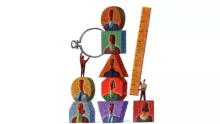Elevating Employee Experience: Transforming Recognition with AI
Recognition is more than just a pat on the back; it is the foundation of a thriving workplace. According to the O.C. Tanner Global Culture Report 2025, employees who are frequently recognised are 12 times more likely to feel engaged and 84% less likely to experience burnout. Yet, many organisations struggle with making recognition consistent, inclusive, and meaningful. Can AI be the game-changer?
To explore this, O.C. Tanner, in partnership with People Matters, hosted a webcast on “Elevating Employee Experience: Transforming Recognition with AI.” The session featured an esteemed panel of experts: Vasumathi Parthasarathy (Head of Performance Management and Employee Recognition, Tata Consultancy Services), Arti Dua (Partner & National Talent Leader, EY), Jayanti Shekar (Principal Director, HR Transformation, LTIMindtree), and Candy Fernandez (Director - People & Great Work, O.C. Tanner).
The discussion delved into the transformative power of recognition in fostering engagement, strengthening a sense of belonging, and mitigating burnout. It also explored AI’s dual role: both as an enabler and a challenge as it integrates into workplace recognition.
AI-powered recognition: making workplace appreciation inclusive and frequent
One of the key themes of the discussion was how AI-powered recognition can make workplace appreciation more inclusive, frequent, and meaningful across diverse employee demographics.
AI’s ability to analyse patterns in behaviour, performance, and preferences enables organisations to offer personalised recognition that resonates with employees. AI-driven platforms provide real-time insights to leaders, ensuring that appreciation is timely, equitable, and free from unconscious biases.
Jayanti Shekar highlighted how AI can bridge gaps in recognition by identifying underrepresented employees who contribute significantly but may go unnoticed. By detecting overlooked contributions, AI ensures that recognition extends beyond traditional high performers.
Meanwhile, Candy emphasised the role of AI-driven nudges, which remind leaders to acknowledge their teams consistently, eliminating favoritism and ensuring a more inclusive culture.
Preventing burnout through AI-driven recognition
Burnout remains a critical challenge in today’s workplace, especially as workloads intensify and hybrid models blur work-life boundaries. With 84% of recognised employees being less likely to experience burnout, AI-driven recognition programs offer a proactive approach to employee well-being.
Candy pointed out that AI can monitor engagement levels, detect early signs of burnout, and prompt managers to step in with meaningful appreciation. By tracking sentiment analysis, workload patterns, and feedback trends, AI helps HR teams intervene before burnout escalates.
“Recognition isn’t just about celebrating big milestones; it’s about appreciating daily efforts that often go unnoticed. AI helps ensure no contribution is left behind, reinforcing a culture of continuous encouragement and support,” remarked Candy Fernandez.
Arti Dua expanded on this, explaining that AI can help create customised recognition strategies that align with employees’ stress levels and work patterns, ensuring appreciation is both timely and impactful.
Overcoming challenges: AI’s role in addressing recognition gaps
Despite the benefits of recognition programs, many organisations face inconsistencies, lack of leadership buy-in, and favoritism. AI provides an objective framework to address these challenges.
Vasumathi highlighted that AI-powered recognition tools standardise appreciation practices, ensuring every employee has an equal opportunity to be recognised. By removing bias and basing recognition on data-driven performance insights, AI fosters a more transparent and trustworthy recognition culture.
“AI removes subjectivity from recognition programs by basing them on data rather than personal biases. This fosters trust and transparency in the system,” noted Vasumathi Parthasarathy.
Meanwhile, Jayanti discussed how AI helps leaders make informed recognition decisions by identifying patterns in engagement and contribution. AI ensures that recognition is aligned with actual performance, eliminating discrepancies caused by human oversight.
Measuring ROI: key AI-Driven metrics for recognition programs
A major concern for HR leaders is proving the ROI of recognition programs. AI enables organisations to track and measure impact through multiple data-driven insights. One of the most significant ways AI enhances ROI measurement is by linking recognition efforts to key business outcomes, making it easier for HR teams to demonstrate tangible value.
AI-powered tools can assess employee engagement levels by tracking sentiment analysis, pulse surveys, and feedback trends, offering a clear view of how recognition influences morale. Additionally, AI can correlate recognition frequency and depth with retention rates, helping organisations understand whether appreciation efforts contribute to long-term employee loyalty. By analysing productivity trends before and after recognition events, AI helps determine whether recognition drives performance improvements.
Arti emphasised that AI’s ability to provide real-time dashboards showcasing recognition impact makes it a game-changer for HR and business leaders. AI-generated insights allow organisations to fine-tune their recognition strategies, ensuring they are not only meaningful but also aligned with business growth objectives.
“AI allows us to connect recognition with real business metrics, providing leaders with dashboards that showcase its direct impact on performance and culture,” said Arti Dua.
What’s Next? The future of AI in employee recognition
Looking ahead, the panelists explored emerging trends in AI-driven recognition. Candy highlighted the growing role of predictive analytics, real-time feedback loops, and hyper-personalisation.
The future of AI in recognition will focus on:
- Automated micro-recognition – AI detecting and rewarding positive workplace behaviours in real time
- Predictive recognition – AI forecasting when employees need encouragement based on engagement levels
- Customised appreciation journeys – AI personalising recognition based on employee preferences and values
Vasumathi emphasised that AI’s role is to enhance, not replace, human-led appreciation.
“AI will not replace human appreciation, but it will make recognition smarter, more timely, and deeply personalised, ensuring employees feel truly valued,” she concluded.
Final thoughts
AI is reshaping employee recognition, making it more consistent, inclusive, and impactful. As organisations continue to integrate AI-driven solutions, the focus should be on blending technology with human empathy to build a culture where appreciation becomes an integral part of the employee experience.
As the discussion highlighted, the future of recognition lies in leveraging AI not just to automate appreciation but to enhance its authenticity, ensuring that every employee feels valued, engaged, and motivated to contribute the












